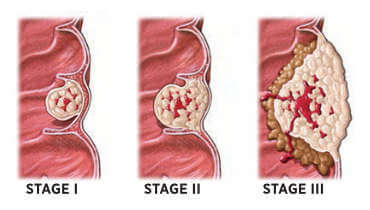« Back to Educational Material
Colorectal cancer occurs when there are growth of abnormal malignant cells that affect the large intestine, which is formed by the colon (the conduit in which the small intestine, measuring 4 to 5 feet of long empties) and the rectum, (the last 20 centimeters of the colon).
Colorectal cancer is the second most common cancer both in men as in women in Puerto Rico. Colorectal Cancer is the second leading cause of cancer death in the woman and the third in man. The presence of polyps in the colon and ulcerative colitis increases the risk of developing Colorectal cancer. Polyps are small masses located in the colon that can become colorectal cancer. Colitis is a chronic and episodic inflammatory disease of the large intestine and rectum, characterized by diarrhea with blood.
RISK FACTORS
- Be 40 years old or older
- Presence of polyps in the colon or ulcerative colitis
- Smoke tobacco
- High fat diet and red meat
- Obesity and a sedentary life
- Excessive alcohol consumption
- Family history of colorectal cancer
CAUSES
The fundamental cause is unknown. There are genetic causes of inheritance, environmental factors such as diet (consumption high of red and fatty meats), obesity, smoking tobacco and drink alcoholic beverages in excess. However, the most important risk factor is age, most of cancers of the colon and rectum are diagnosed after 40 years and patients have no factors of identifiable risk.
SIGNS AND SYMPTOMS
It usually has no symptoms until advanced stages. Some of the main symptoms manifested by the colorectal cancer could be:
- Changes in evacuation habits (diarrhea or constipation) or in the size or shape of stool.
- Rectal bleeding.
- Pain or swelling in the lower belly.
- Low iron or low hemoglobin deficiency for reasons unknown.
PREVENTION
- Do not smoke tobacco
- Eat less fat and be moderate in the consumption of red meat in your regular diet.
- Take a daily aspirin: Could reduce the risk in the development of polyps or colorectal cancer. Check with your doctor how safe it is for you to take an aspirin.
- Eat calcium supplements: 500mg of calcium per day, may decrease the risk of colorectal cancer.
- Stay physically active. Incorporate physical activity in your daily routine. Some examples: walking, swimming, running bike and/or dance.
DIAGNOSIS
The three basic tests to detect colon cancer are:
- Stool test: verify the presence of blood hidden.
- Sigmoidoscopy: inspection of the distal part of the colon the last two feet.
- Colonoscopy: inspection of the entire colon using a flexible tube, called a colonoscope, that has a light source, camera and a channel to do biopsies of being necessary.
The fecal occult blood test identifies the presence of blood that could represent the presence of polyps or cancer. If blood is identified in the tests tool, a colonoscopy is recommended to evaluate the colon and rectum. Colonoscopy allows you to evaluate the inside the colon and rectum to identify polyps and remove them, and thus prevent the development of colorectal cancer.
The occult blood test, sigmoidoscopy and colonscopy have different risks and benefits, check with your doctor to determine what is the best option for you. In addition, the doctor will take in consideration if there is any person in your family diagnosed with this cancer or if you suffer from inflammation of the intestine when choosing options.
COLORECTAL CANCER STATES

The classification of carcinomas, is carried out, according to the size of the tumor and the degree of penetration in the walls of the colon and rectum.
When the tumor is small and has not penetrated the mucosa layer, is said to be a Stage I cancer. Tumors in Stage II are inside the muscular wall, and in Stage III affects nearby lymps nodes. Cancers in Stage IV have spread (metastasized) to distant organs. The most common place where colorectal cancer spreads is the liver.
TREATMENT
For the treatment of colon cancer there are three available treatments: surgery, chemotherapy and radiotherapy (for rectal cancer). Your doctor determines the most appropriate plan for you depending on the location, extent and type of tumor.
Download and save this information
